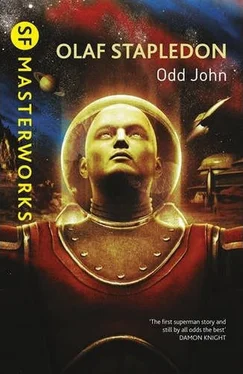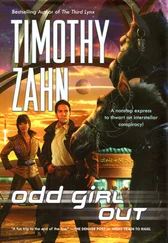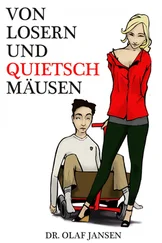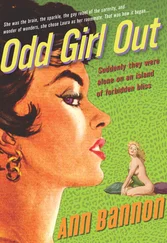Olaf Stapledon - Odd John
Здесь есть возможность читать онлайн «Olaf Stapledon - Odd John» весь текст электронной книги совершенно бесплатно (целиком полную версию без сокращений). В некоторых случаях можно слушать аудио, скачать через торрент в формате fb2 и присутствует краткое содержание. Город: London, Год выпуска: 2012, ISBN: 2012, Издательство: Hachette UK, Жанр: Фантастика и фэнтези, на английском языке. Описание произведения, (предисловие) а так же отзывы посетителей доступны на портале библиотеки ЛибКат.
- Название:Odd John
- Автор:
- Издательство:Hachette UK
- Жанр:
- Год:2012
- Город:London
- ISBN:9780450038570
- Рейтинг книги:5 / 5. Голосов: 1
-
Избранное:Добавить в избранное
- Отзывы:
-
Ваша оценка:
- 100
- 1
- 2
- 3
- 4
- 5
Odd John: краткое содержание, описание и аннотация
Предлагаем к чтению аннотацию, описание, краткое содержание или предисловие (зависит от того, что написал сам автор книги «Odd John»). Если вы не нашли необходимую информацию о книге — напишите в комментариях, мы постараемся отыскать её.
Odd John — читать онлайн бесплатно полную книгу (весь текст) целиком
Ниже представлен текст книги, разбитый по страницам. Система сохранения места последней прочитанной страницы, позволяет с удобством читать онлайн бесплатно книгу «Odd John», без необходимости каждый раз заново искать на чём Вы остановились. Поставьте закладку, и сможете в любой момент перейти на страницу, на которой закончили чтение.
Интервал:
Закладка:
Ever since those days any great strain was liable to bring sleep upon her, with all its horrors. She reported, however, that the attacks were now much less frequent; but that on the other hand the content of her dreams was more terrible, because—she couldn’t properly explain—because it was more universal, more metaphysical, more cosmically significant, and at the same time more definitely an expression of something Satanic (her own word) within her very self.
CHAPTER XVIII
THE SKID ’S FIRST VOYAGE
HENCEFORTH Pax was more at ease with Lo. She had nursed her, received her confidence, and found occasion to pity her. All the same it was clear that the continued presence of Lo was a strain on Pax. When the yacht was launched, John himself said to me, “We must get away as soon as possible now. Lo is killing Pax, though she does her best not to. Poor Pax! She’s being driven into old age at last.” It was true. Her hair was fading, and her mouth drawn.
It was with mixed feelings that I learned that I was not to take part in the coming voyage in search of additional members for the colony. I could live my own life. I could marry and settle down, holding myself in readiness to serve John when he should need me. But how could I live without John? I tried to persuade him that I was necessary to him, A saucer-like craft wandering the oceans with a crew of three children would attract less attention if she carried one adult. But my suggestion was dismissed. John claimed that he no longer looked a child, and further declared that he could touch up his face so as to appear at least twenty-five.
I need not describe in detail the preparations which these three young eccentrics undertook in order to fit themselves for their adventure. Both Ng-Gunko and Lo had to learn to fly; and all three had to become familiar with the mannerisms of their own queer aeroplane and their own queer yacht. The vessel was launched on the Clyde by Pax, and christened Skid , under which odd but appropriate name she was duly registered. I may mention that for the Board of Trade inspection she was fitted with a normal motor-engine, which was subsequently removed to make room for the psycho-physical power unit and motor.
When both yacht and plane were ready for use, a trial trip was made among the Western Isles. On this trip I was tolerated as a guest. The experience was enough to cure me of any desire for a longer voyage in such a diabolical vessel. The three-foot model had somehow failed to make me imagine the discomforts of the actual boat. Her great beam made her fairly steady, but she was so shallow, and therefore low in the water, that every considerable wave splashed over her, and in rough weather she was always awash. This did not greatly matter, as her navigating controls were all under cover in a sort of stream-lined deck-house reminiscent of a sporting saloon motor-car. In fine weather one could stretch one’s legs on deck, but below deck there was scarcely room to move, as she was a mass of machinery, bunks, stores. And there was the plane. This strange instrument, minute by ordinary standards, and folded up like a fan, occupied a large amount of her space.
After emerging from Greenock we skidded comfortably down the Clyde, past Arran, and round the Mull of Kintyre. Then we struck heavy weather, and I was violently sick. So also, much to my satisfaction, was Ng-Gunko. Indeed, he was so ill that John decided to make for shelter, lest he should die. But quite suddenly Ng-Gunko learned to control his vomiting reflexes. He stopped being sick, lay still for ten minutes, then leapt from his bunk with a shout of triumph, only to be hurled into the galley by a lurch of the ship.
The trials were said to be entirely successful. When she was going full speed the Skid lifted the whole fore part of herself right out of the water and set up a mountain-range of water and foam on either side of her. Though the weather was rather wild, the plane also was tested. It was heaved out aft on a derrick and unfolded while afloat. All three members of the crew took a turn at flying it. The most surprising thing about it was that, owing to its cunning design and its immense reserve of power, it rose straight from the water without taxi-ing.
A week later the Skid set out on her first long voyage. Our farewells were made at the dock. The Wainright parents reacted very differently to the departure of their youngest son. Doc was genuinely anxious about the dangers of the voyage in such a vessel, and mistrustful of the abilities of the juvenile crew. Pax showed no anxiety, so complete was her confidence in John. But clearly she found it difficult to face his departure without showing distress. Hugging her, he said, “Dear Pax,” then sprang on board. Lo, who had already made her farewells, came back to Pax, took both her hands, and said, actually smiling, “Dear mother of important John!” To this odd remark Pax replied simply with a kiss.
My slender knowledge of the voyage is derived partly from John’s laconic letters, partly from conversation after his return. The programme was determined by his telepathic researches. Distance, apparently, made no difference to the ease with which he could pick up the psychic processes of other supernormals. Success depended entirely on his ability to “tune in” to their mental “setting” or mode of experience, and this depended on the degree of similarity of their mode to his own. Thus he was already in clear communication with a supernormal in Tibet, and two others in China, but for the rest he could only make the vaguest guesses as to the existence and location of possible members of the colony.
Letters told us that the Skid had spent an unprofitable three weeks on the West Coast of Africa. John had flown into the hinterland, pursuing traces of a supernormal in some oasis in the Sahara. He struck a sand storm of peculiar violence, and made a forced landing in the desert, with his engine choked with sand. “When the wind had dropped I cleaned her guts,” said John, “and then flew back to the Skid , still chewing sand.” What epic struggles were involved in this adventure I can only guess.
At Cape Town the Skid was docked, and the three young people set off to comb South Africa, following up certain meagre traces of the supernormal mentality. Both John and Lo soon returned empty-handed. In his letter John remarked, “Delicious to watch the Whites treating the Blacks as an inferior species. Lo says it reminds her of her mother’s stories of Tsarist Russia.”
John and Lo waited impatiently for some weeks while Ng-Gunko, doubtless revelling in his return to native conditions, nosed about in the remote woodlands and saltpans of Ngamiland. He was in telepathic communication with John, but there seemed to be some mystery about his activities. John grew anxious, for the lad was dangerously juvenile, and possibly of a less balanced type than himself. At last he was driven to tell Ng-Gunko that if he did not “chuck his antics” the Skid would sail without him. The reply was merely a cheerful assurance that he would be starting back in a day or two. A week later came a message that combined a cry to triumph and an S.O.S. He had secured his prey, and was making his way through the wilds to civilization, but had no money for the return railway journey. John therefore set out to fly to the spot indicated, while Lo, single handed, took the Skid round to Durban.
John had already been waiting some days at the primitive settlement when Ng-Gunko appeared, dead beat, but radiant. He removed a bundle from his back, uncovered the end of it, and displayed to the indignant John a minute black infant, immature, twitching and gasping.
Ng-Gunko, it seems, had traced the telepathic intimations to a certain tribe and a certain woman. His African experiences had enabled him to detect in this woman’s attitude to the life of the forest something akin to his own. Further investigation led him to believe that though she herself was in some slight degree supernormal, the main source of those obscure hints which he had been pursuing was not the mother but her unborn child, in whose pre-natal experiences Ng-Gunko recognized the rudiments of supernormal intensity. It was indeed remarkable that before birth a mind should have any telepathic influence at all. The mother had already carried her baby for eleven months. Now Ng-Gunko knew that he himself had been born late, and that his mother had not been delivered of him till certain incentives had been used upon her by the wise women of the tribe. This treatment he persuaded the black matron to undergo, for she was weary to death. As best he could, Ng-Gunko applied what he knew of the technique. The baby was born, but the mother died. Ng-Gunko fled with his prize. When John asked how he had fed the baby on the long journey, Ng-Gunko explained that in his Abyssinian days he and other youngsters used to milk wild antelopes. They stalked them, and by means of a process that reminded me of “tickling” trout, they persuaded the mothers to let themselves be milked. This trick had served on the journey. The infant, of course, had not thrived, but it was alive.
Читать дальшеИнтервал:
Закладка:
Похожие книги на «Odd John»
Представляем Вашему вниманию похожие книги на «Odd John» списком для выбора. Мы отобрали схожую по названию и смыслу литературу в надежде предоставить читателям больше вариантов отыскать новые, интересные, ещё непрочитанные произведения.
Обсуждение, отзывы о книге «Odd John» и просто собственные мнения читателей. Оставьте ваши комментарии, напишите, что Вы думаете о произведении, его смысле или главных героях. Укажите что конкретно понравилось, а что нет, и почему Вы так считаете.












